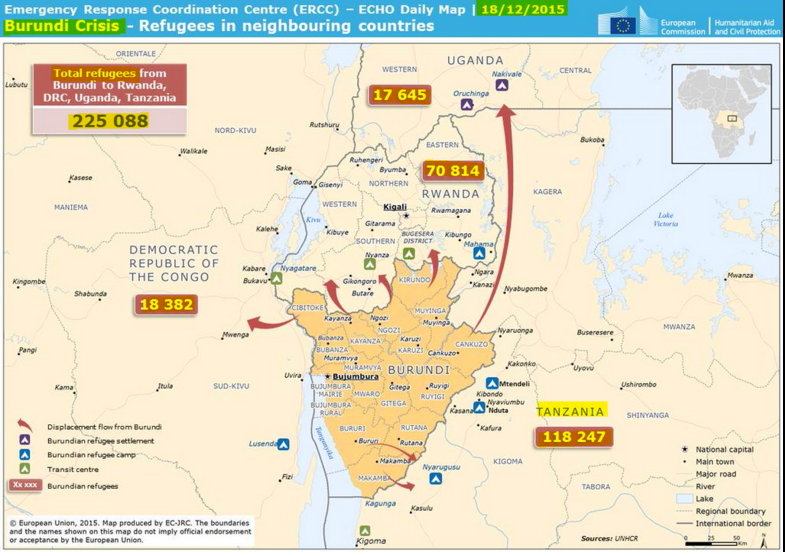STP Target Overview : Burundi
STP Target Dates : January 6 -15, 2016
Target : Burundi
Overview : en.wikipedia.org/wiki/Burundi
Burundi is a landlocked, resource-poor country with an underdeveloped manufacturing sector. The economy is predominantly agricultural; agriculture accounts for just over 40% of GDP and employs more than 90% of the population. Burundi's primary exports are coffee and tea, which account for 90% of foreign exchange earnings, though exports are a relatively small share of GDP. Therefore, Burundi's export earnings - and its ability to pay for imports - rests primarily on weather conditions and international coffee and tea prices. An ethnic-based war that lasted until 2005 resulted in more than 200,000 deaths, forced more than 48,000 refugees into Tanzania, and displaced 140,000 others internally. Food, medicine, and electricity remain in short supply. Burundi's GDP grew around 4% annually in 2006-14. Political stability and the end of the civil war have improved aid flows and economic activity has increased, but underlying weaknesses - a high poverty rate, poor education rates, a weak legal system, a poor transportation network, overburdened utilities, and low administrative capacity - risk undermining planned economic reforms. Government corruption is hindering the development of a healthy private sector as companies have to deal with ever changing rules. The purchasing power of most Burundians has decreased as wage increases have not kept up with inflation. Burundi will remain heavily dependent on aid from bilateral and multilateral donors - foreign aid represents 42% of Burundi's national income, the second highest rate in Sub-Saharan Africa. Burundi joined the East African Community (EAC) in 2009, and regional infrastructure improvements driven by the EAC and funded by the World Bank may help improve Burundi’s transport connections and lower transportation costs.
Geography/ Climate : lajhsslab.com/asos/burundi/landscape.htm
History : en.wikipedia.org/wiki/History_of_Burundi
Travel Guides : www.worldtravelguide.net/burundi
Immunizations required : wwwnc.cdc.gov/travel/destinations/traveler/mission_disaster/burundi?s_cid=ncezid-dgmq-travel-single-001
People : en.wikipedia.org/wiki/Urewe
en.wikipedia.org/wiki/Origins_of_Hutu_and_Tutsi
Global Peace Index Ranking : 130 (where 162 is the worst) en.wikipedia.org/wiki/Global_Peace_Index#Global_Peace_Index_rankings
Health : www.who.int/countries/bdi/en/ and https://en.wikipedia.org/wiki/ Health_in_Burundi
Average life expectancy in 2005 was estimated at 50 years, up from 42 years in 2000. There were approximately 8,000 war-related deaths during the conflict between the Tutsis and Hutus from 1988 to 1992. The death rate was estimated at 16 per 1,000 as of 2002. The HIV/AIDS prevalence was 6.00 per 100 adults in 2003. As of 2004, there were approximately 250,000 people living with HIV/AIDS in Burundi. There were an estimated 25,000 deaths from AIDS in 2003.
GDP per capita (current US$) : 286.0 in 2014 http://knoema.com/mhrzolg/gdp-statistics-from-the-world-bank?country=Burundi
(GDP in USA, 2014, for comparison : 54,629.50 US$/ capita).
The GDP per capita was as follows for these countries, expressed in current $US :
Syria: 2,080/ cap in 2007
Yemen : 1,408/ cap in 2013
Burundi : 286/ cap in 2014
Cambodia : 1,090/ cap in 2014
Belgium : 47,517/ cap in 2014
U.S.A. : 54,629/ cap in 2014
Corruption : Burundi has retained the top position as the most bribery prone country in East Africa. 2014 Score 20 (0-100) and rank: 159/175 countries
Government corruption is hindering the development of a healthy private sector as companies seek to navigate an environment with ever changing rules.
Strengths/ Weaknesses : www.coface.com/Economic-Studies-and-Country-Risks/Burundi and,
www.afdb.org/fileadmin/uploads/afdb/Documents/Project-and-Operations/Burundi%20-%20CSP%202012-16.pdf
Peace & Compassion Deficits : www.who.int/hac/crises/bdi/releases/9november2015/en/
en.wikipedia.org/wiki/2015_Burundian_unrest
Burundi is a source country for children and possibly women subjected to forced labor and sex trafficking; business people recruit Burundian girls for prostitution domestically, as well as in Rwanda, Kenya, Uganda, and the Middle East, and recruit boys and girls for forced labor in Burundi and Tanzania; children and young adults are coerced into forced labor in farming, mining, construction, informal commerce, or fishing; some family members, friends, and neighbors are complicit in exploiting children, luring them in with offers of educational or job opportunities.
"The UN is woefully unprepared to tackle the possibility of worsening bloodshed in Burundi, according to a confidential memo written by the organization's peacekeeping office and obtained by VICE News.
The document is part of contingency planning underway at both the United Nations and the African Union (AU) for future operations in Burundi, and was sent to Security Council members earlier this week. Signed by Herve Ladsous, head of the UN's Department of Peacekeeping (DPKO), the memo envisions various scenarios in Burundi, ranging from continued sporadic violence to genocide-type situations, as well as possible UN deployments in the country.
None of deployment options appear capable of protecting most Burundians in the event of open war or more widespread killings. "Most importantly," DPKO wrote, "United Nation's peacekeeping is limited in its ability to address significant violence against civilians, even violence amounting to genocide, where it lacks a political framework and the strategic consent of the host nation and/or the main parties to the conflict."
Just a decade removed from civil war, fears of such violence in Burundi have increased in the past year, reaching a bloody crescendo last month when more than 80 people — and possibly many more — were killed in the span of several days."

